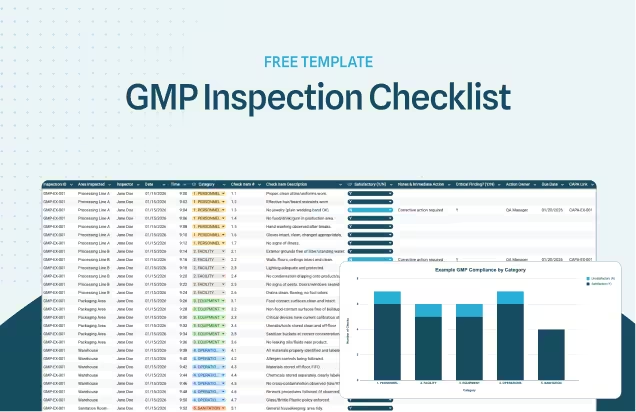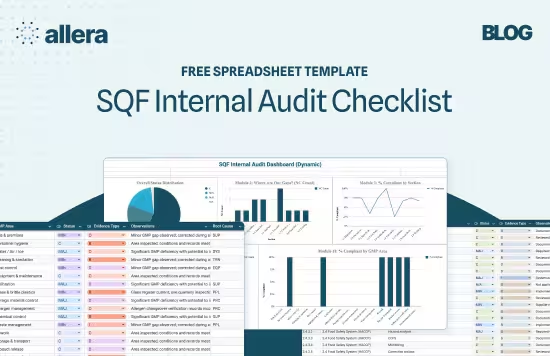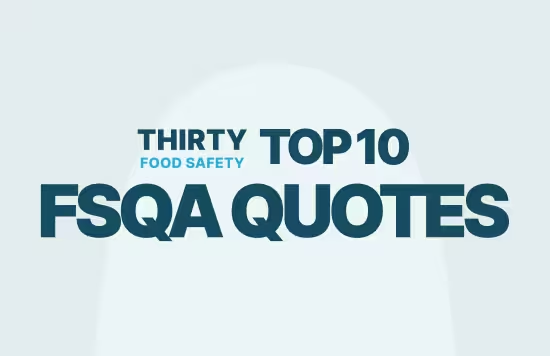

Best FSSC 22000 Certification Bodies: How to Choose
.avif)
Key Takeaways for Food Manufacturers
- FSSC 22000 is a GFSI-recognized scheme combining ISO 22000, prerequisite programs, and additional requirements tailored for food production.
- The right certification body (CB) for food manufacturers depends on facility size, geographic location, product category, and customer requirements.
- Global CBs such as LRQA, SGS, BSI, and DNV dominate the market with strong reputations, but local CBs may offer better value and responsiveness for smaller producers.
- Certification costs for food manufacturers typically range from USD $10,000–50,000+, depending on facility size, scope, and audit complexity.
- Food companies must focus not just on getting certified but on maintaining compliance through continuous monitoring, internal audits, and digital documentation.
Food manufacturers face rising pressure to prove that their operations meet international food safety expectations. In a landscape where one mistake can trigger costly recalls or lost contracts, FSSC 22000 certification has become the passport to retailer shelves and export markets.
But certification isn’t automatic. The choice of certification body (CB) can mean the difference between smooth approval and expensive setbacks.
This guide breaks down the essentials for food manufacturers: who the best FSSC 22000 certification bodies in 2025 are, what certification costs to expect, and how to meet requirements without overspending. We also look at fundamental certification, internal auditor training, lead auditor certification, and practical strategies to lower audit risk.
What Is FSSC 22000 and Why It Matters to Food Manufacturers
FSSC 22000 (Food Safety System Certification) is a comprehensive food safety management system (FSMS) framework designed for organizations across the food supply chain, including food manufacturers, packaging, feed, catering, and distribution. It brings together multiple layers of control and oversight, ensuring that food companies can demonstrate robust, audit-ready compliance. The framework integrates three core components:
- ISO 22000: The backbone Food Safety Management System standard, outlining management commitment, communication, and continual improvement requirements.
- PRPs (Prerequisite Programs): Sector-specific hygiene and operational requirements that vary by food category (e.g., PRPs for dairy differ from those for baked goods or packaging).
- FSSC Additional Requirements: Covering emerging risks like food fraud prevention, allergen cross-contact, environmental monitoring, and management of outsourced processes.
For food manufacturers, certification under FSSC 22000 goes beyond meeting regulations. It offers measurable business advantages, including:
- Market Access: Retailers and distributors, especially in North America and Europe, increasingly require FSSC 22000 certification before accepting suppliers. Without it, manufacturers risk being excluded from key food supply chains.
- Risk Mitigation: Certification forces a structured HACCP-based approach, reducing the likelihood of recalls, contamination incidents, or reputational damage.
- Operational Consistency: Standardized processes and documented procedures help ensure consistency across production lines, facilities, and even multi-site operations.
- Customer Confidence: Certification signals to buyers and consumers that the manufacturer prioritizes food safety and quality.
- Continuous Improvement: Through surveillance audits and management reviews, food companies build a culture of ongoing improvement rather than one-time compliance.
For food manufacturers, certification under FSSC 22000 is more than a compliance checkbox. It provides:
- Market Access: Many major retailers, especially in North America and Europe, mandate FSSC 22000 or another GFSI-recognized certification.
- Risk Mitigation: Certification helps manufacturers reduce food safety incidents and avoid costly recalls.
- Operational Consistency: Standardized processes support consistent product quality across batches and facilities.
Role of Certification Bodies (CBs) for Food Manufacturers
Certification Bodies are independent, licensed organizations authorized to certify food manufacturers under FSSC 22000. Their responsibilities include:
- Initial Certification Audits:
- Stage 1: Review of food safety documentation.
- Stage 2: On-site audit of food production and processes.
- Annual Surveillance Audits: Ensuring continued compliance.
- Recertification Audits: Conducted every three years.
- Audit Report Submissions: Uploading results to the official FSSC database.
For food manufacturers, the choice of CB determines not just audit outcomes but also customer trust and cost efficiency. Some CBs bring extensive experience with complex processing plants, while others may specialize in SMEs or specific product categories.
Leading FSSC 22000 Certification Bodies in 2025 for Food Manufacturers
1. LRQA (Lloyd’s Register Quality Assurance)
- Expertise: LRQA is one of the oldest and most established certification bodies, well known for auditing large-scale, multinational food manufacturers with complex global operations. They bring deep experience in sectors such as ready-to-eat meals, dairy, frozen foods, and beverage production.
- Services: Beyond certification, LRQA provides pre-assessment, gap analysis, and training services that help food manufacturers identify weaknesses before audits. Their auditors are trained to provide constructive feedback on HACCP plans, allergen management, and supplier verification systems.
- Reputation: LRQA holds strong credibility with global retailers and regulatory bodies, making it especially valuable for exporters to North America and the EU.
- Considerations: Costs are typically higher due to their international reputation, but for manufacturers with multiple facilities or export-driven growth, the investment often secures access to new markets.
Best Fit: Multinational food processors, exporters, and manufacturers operating in multiple jurisdictions who need credibility and consistency.
2. SGS (Société Générale de Surveillance)
- Expertise: SGS is one of the largest CBs globally, with auditors in more than 100 countries. They are widely used by food manufacturers in dairy, meat, seafood, and packaged food sectors.
- Services: SGS offers integrated audits across multiple standards (FSSC 22000, ISO 9001, ISO 14001, ISO 45001), which can reduce duplication and save time for manufacturers already holding multiple certifications. Their IT systems provide strong audit tracking and document management.
- Reputation: Trusted worldwide, SGS is often named as a preferred certification partner by multinational retailers and brand owners.
- Considerations: Because SGS operates at a global scale, scheduling audits can sometimes be slower. Fees may also reflect their broad reputation and infrastructure.
Best Fit: Large manufacturers needing global recognition, companies with multi-standard certifications, and exporters serving diverse regions.
3. BSI Group (British Standards Institution)
- Expertise: BSI has a long history as a standards developer and certification body. They are particularly strong in food manufacturing and packaging certification, making them a reliable choice for processors and suppliers.
- Services: Emphasis on training and capability-building for food manufacturer teams. They provide workshops, online learning, and auditor training that can help companies strengthen compliance long-term.
- Reputation: Highly respected for their structured and educational approach, making them attractive for manufacturers who want certification plus team development.
- Considerations: BSI may be less cost-effective for very small food producers, as their services are designed for companies that value training and structured improvement.
Best Fit: Mid-sized food manufacturers seeking both certification and employee training to embed a culture of food safety.
4. DNV (Det Norske Veritas)
- Expertise: DNV has deep experience in high-risk, technical food manufacturing environments such as seafood, meat, frozen foods, and processed goods. Their auditors often come from engineering or food science backgrounds.
- Services: Known for technical depth, DNV goes beyond compliance checks to assess sustainability practices, food fraud prevention, and environmental monitoring.
- Reputation: Particularly strong in Europe and Asia, and trusted by buyers looking for technically rigorous audits.
- Considerations: While thorough, DNV audits may be more demanding, requiring strong internal preparation. This can be beneficial for manufacturers wanting to elevate their compliance maturity.
Best Fit: Food manufacturers with complex processes, global exporters, and companies integrating sustainability and technical compliance.
5. Local / Regional CBs (e.g., ICONTEC, GW Certified SC)
- Expertise: Regional CBs are licensed for specific countries or regions, offering knowledge of local regulations and practices that global CBs may overlook.
- Services: Lower travel expenses and faster scheduling due to local presence. They may also offer more personalized service for SMEs.
- Reputation: While not always recognized by large international retailers, regional CBs can provide adequate compliance credibility for domestic markets.
- Considerations: Manufacturers planning to export may face challenges if their certification is not accepted globally. However, for SMEs operating locally, they are often the most cost-effective solution.
Best Fit: Small to mid-sized food manufacturers serving domestic markets, prioritizing cost savings and faster audit timelines.
Certification Costs in 2025 for Food Manufacturers
For food manufacturers, certification costs vary based on production scale, number of employees, and complexity of operations.
Key Cost Drivers
- Facility Size: Larger plants require more audit days.
- Scope: Whether certification covers processing, packaging, storage, or transport.
- Multi-Site Certification: Each site increases audit costs.
- Geography: Travel and local auditor fees vary.
- Existing Certifications: Manufacturers with ISO systems in place may reduce costs.
- Pre-Audit Services: Gap analyses or mock audits add costs but lower risks.
Typical Cost Ranges
- Small/medium manufacturers: USD $10,000–25,000.
- Large manufacturers: USD $30,000–50,000+.
- India example: Large plants report INR 7–12 lakh (≈ USD $8,500–15,000).
Certification Requirements for Food Manufacturers
To achieve FSSC 22000 certification, food manufacturers must implement:
- A documented Food Safety Management System (FSMS) aligned with ISO 22000.
- PRPs specific to food processing, packaging, or distribution.
- A validated HACCP plan.
- A formal Food Safety Policy signed by leadership.
- Internal audits and management reviews prior to external audits.
- Corrective actions for all non-conformities.
- Staff training programs for food handlers and managers.
For smaller manufacturers, starting with FSSC 22000 fundamental certification is an option before scaling up to full certification.
Choosing the Right Certification Body for Food Manufacturers
Food manufacturers should weigh several considerations when selecting a CB:
- Licensing: Confirm the CB is licensed for your sector.
- Food Sector Expertise: Dairy, seafood, bakery, frozen foods, etc.
- Geographic Presence: Local CBs reduce costs, but global CBs may be required by buyers.
- Retailer Expectations: Many major retailers prefer audits from SGS, LRQA, or BSI.
- Audit Integration: Combining FSSC 22000 with ISO 9001 or ISO 14001 can save time.
Pros and Cons for Food Manufacturers
Internal and Lead Auditor Training for Food Manufacturers
Food manufacturers often benefit from internal auditor certification or lead auditor certification to:
- Conduct internal FSMS audits.
- Detect issues before external audits.
- Train staff on corrective actions.
- Build in-house expertise and reduce reliance on consultants.
Practical Tips for Food Manufacturers to Reduce Certification Costs
- Perform a gap analysis before audits.
- Train production line staff on food safety requirements.
- Use digital documentation systems like Allera for easier audits. (Try out Allera's QMS interactive demo).
- Combine audits with ISO certifications.
- Focus audit scope on critical processes.
- Invest in in-house auditor training.
- Plan early to minimize auditor travel costs.
- Schedule mock audits for readiness.
Staying Compliant Beyond Certification
For food manufacturers, certification under FSSC 22000—whether for the first time, at a fundamental level, or across multiple sites—is becoming a market necessity. Retailers and consumers expect verifiable food safety practices, and certification is proof.
- Global CBs give exporters and large manufacturers maximum credibility.
- Local CBs provide practical value for SMEs focused on domestic supply.
The real challenge for food manufacturers is staying compliant every day—not just at audit time. That’s where Allera provides support. Our compliance software centralizes documentation, audit records, and corrective action tracking, ensuring food manufacturers stay aligned with FSSC 22000 certification requirements year-round.
How Allera Helps Food Manufacturers
- Preparation: Automated SOP management and documentation.
- Audit Readiness: Real-time access to records for auditors.
- Ongoing Compliance: Corrective action tracking, updated PRPs, and continuous improvement.
With Allera, food manufacturers can not only get FSSC 22000 certification but also sustain compliance as a long-term competitive edge.
FAQs
What are the three components of FSSC 22000?
- ISO 22000 food safety management system requirements.
- Sector-specific prerequisite programs (PRPs).
- FSSC additional requirements such as food fraud prevention and allergen management.
Does FSSC 22000 include ISO 9001?
No. FSSC 22000 is based on ISO 22000, not ISO 9001. However, organizations can integrate ISO 9001 (quality management) with FSSC 22000 for a combined food safety and quality system, but it is optional.
Is FSSC certification important?
Yes. It demonstrates GFSI-recognized food safety assurance, increases access to global markets, reduces risk of recalls, and improves trust with retailers and customers. Many international buyers require FSSC certification for suppliers.
How long is FSSC 22000 certification valid?
It is valid for 3 years, provided annual surveillance audits are passed to maintain compliance.
What are the requirements for FSSC 22000?
Key requirements include:
- Full compliance with ISO 22000.
- Implementation of PRPs specific to the food sector (ISO/TS 22002-x or equivalent).
- Additional FSSC requirements covering allergen management, food fraud and defense, product labeling, environmental monitoring, and management of services and suppliers.
What does it mean to be FSSC 22000 certified?
It means a company has implemented a globally recognized, GFSI-approved food safety management system that controls food hazards, prevents food fraud, and complies with legal and customer requirements throughout the food supply chain.
What is the difference between ISO 22000 and FSSC?
ISO 22000 is an international standard for food safety management systems, outlining requirements to control food safety hazards across the supply chain. FSSC 22000 builds on ISO 22000 by adding sector-specific prerequisite programs (PRPs) and additional requirements such as food fraud prevention, allergen management, and stricter audit rules. FSSC 22000 is also fully benchmarked and recognized by the Global Food Safety Initiative (GFSI), while ISO 22000 alone is not.
What are the three grading levels in FSSC 22000?
FSSC 22000 grading is based on audit results:
- A: Minor nonconformities only, certification granted.
- B: Moderate findings, certification granted with follow-up required.
- C: Serious nonconformities, certification suspended until corrected.
How to get FSSC certification?
Steps include:
- Conduct a gap analysis against
- ISO 22000, PRPs, and FSSC additional requirements.
- Implement necessary policies, procedures, and controls.
- Train staff and run internal audits.
- Choose an accredited certification body.
- Complete Stage 1 (documentation review) and Stage 2 (on-site audit).
- Correct any nonconformities and receive certification.
How long does it take to get FSSC 22000 certification?
The process usually takes 6–12 months depending on the size of the organization, existing food safety systems, and readiness. Time is needed for gap analysis, implementing requirements, employee training, internal audits, and the external certification audit.
What does FSSC stand for?
FSSC stands for Food Safety System Certification.
How much does FSSC 22000 certification cost?
Costs vary by organization size, location, and certification body. Small businesses may spend $10,000–$25,000 including audits, training, and implementation, while larger or multi-site operations can exceed $50,000. Annual surveillance audits also add recurring costs.
.avif)





.avif)


.avif)


